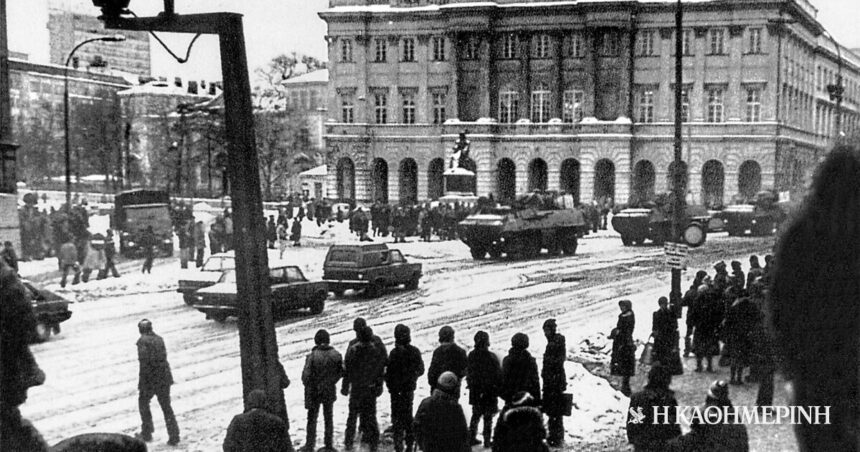On the morning of December 13, 1981, the surprised Polish people were informed by radio and television that martial law had been declared and the armed forces were officially taking over the government of the country. The news went around the world and was the first story in all the news bulletins: the unprecedented fact of the direct takeover of the government by the military in a communist country impressed enemies and friends of the existing socialist regimes and worried many scholars about their future.
But how – and above all why – did things get to this point in Poland;
Economic problems brought political impasses
The economic problems faced by Poland in the previous years had already turned from 1980 into political problems for the communist regime: the establishment and rapid spread of the trade union Solidarity and his independent trade union movementtogether with the apparent weakness of the ruler Labor (Communist) Party to deal with shortages of consumer goods, the country’s financial poverty, falling purchasing power and constant strikes, had led the political leadership to an impasse. In September 1980 the leader of Poland Edward Gerek had been deposed, accused of corruption, and had been replaced by Stanislav Kanya. Even he, however, had not managed to deal effectively with the problems of the regime, resulting in the prolongation of the crisis which was beginning to take a threatening turn for the communist government.
From September 1981, Jaruzelski was conspiring with his staff to find an excuse to impose a dictatorship.
Kania advocated the use of state propaganda as well as the erosion of opposition trade unions by state secret services to deal with counterinsurgency, but not the use of open violence. However, other, more dynamic, views prevailed. On February 11, 1981, Mr General Wojciech Jaruzelskiuntil then defense Ministerwas appointed Prime Minister. On October 18, Kania was dismissed as its first secretary Central Committee of the Polish United Workers’ Partyafter his telephone review was intercepted on Soviet leadership. Jaruzelski was elected as his successor, the only professional military man to become the leader of a ruling European communist party. Even before taking office, Jaruzelski ordered it Polish General Staff to develop plans for imposition of martial law on October 22, 1980.
In February 1981 the Ministry of Defense and Ministry of Interior they agreed that the state propaganda to request the support of the army under the pretext of peace and stability. It was also pointed out that martial law had to be imposed before Solidarity and its allies organized a general strike that would paralyze the entire country. As early as September 1981, as prime minister, he was conferring with his staff to find an excuse to impose a dictatorship. Amid growing popular pressure with demonstrations and strikes, the die was cast three months later.
Thousands of arrests and bloody suppression of demonstrations
On December 12, 1981, shortly before midnight, the Polish Council of State met in Warsaw and approved martial law. At the same time, the Military Council of National Salvation: members of, high officers of Polish People’s Armywho headed the military junta.

At exactly midnight the military units began to move in and arrest the first members of Solidarity, placing them in custody. In total, approximately 100,000 soldiers, intelligence officers and militiamen were mobilized, supported by several hundred tanks and armored vehicles. Telephone lines were cut across the country to prevent Solidarity members from communicating and reacting with protests. A strict curfew was imposed from 7 pm to 6 am. The country’s borders were closed, as were all airports, and road access to major cities was restricted. Postal letters were severely censored, all independent political organizations were banned, and classes in schools and universities were temporarily suspended.
Many journalists, teachers and professors were excluded from their professions because of their attitude towards “Solidarity”.
The media, public services, hospitals, power stations, coal mines, ports, railway stations and most key factories were placed under military command: officials who did not follow military orders faced court-martial. As part of the crackdown, the media and educational institutions were “vetted”, a process that tested each worker’s attitude towards the regime and Solidarity. As a result, thousands of journalists, teachers and professors were excluded from their professions.
The enforcement of the coup was not bloodless. Official reports in the first days put about a dozen dead, while a parliamentary commission in 1989-1991 put the number at over 90. Three days after the coup, miners in the industrial city of Katowice went on strike against the declaration of martial law. The army reacted violently and the strike was bloodily suppressed: dozens of soldiers and policemen, as well as 21 strikers were injured, eight were killed on the spot and one died in hospital (the youngest victim was only 19 years old).
On the same day, a demonstration of 30,000 men took place in his port Gdansk. Clashes with security forces continued until December 17 and more than 300 people were injured. Security forces opened fire as the crowd approached the ruling party’s headquarters in Gdansk, killing one and injuring many. In Krakow there were also large demonstrations against martial law and the communist regime.
Dictatorship instead of invasion? The question of Soviet intentions
In the following years, the protests and clashes would continue. Although martial law was officially imposed in July 1983, the government and security forces continued to censor, prosecute and imprison thousands of journalists and opposition activists without charge. The socio-economic crisis deepened even further than in the late 1970s and rationing of basic foods such as sugar, milk and meat, as well as materials such as petrol continued, while the population’s income fell by up to 10% . During Jaruzelski’s rule until 1989, 100,000 to 300,000 people left the country.
The reaction of the West was strong, with the American president Ronald Reagan to impose economic sanctions on Poland and Soviet Union and European Economic Community to follow suit, beyond diplomatic protest. His reaction was also strong Vaticanas the Pope John Paul he was of Polish origin: in the following years the Vatican would support in every way the resistance against the communist regime.
One of the great historical questions of the time has to do with whether Jaruzelski anticipated the Soviet intervention in Poland. According to him, martial law was necessary to prevent a potentially disastrous military intervention by the USSR – similar to the previous interventions in Hungary in 1956 and Czechoslovakia in 1968. However, at a press conference in September 1997, the Viktor Kulikov, former supreme commander of the Warsaw Pact forces, denied that the Soviet Union intended to intervene. According to his minutes Politburo of the CPSUon December 10, 1981 o Yuri Andropov, KGB commander, stated that “we do not intend to bring troops into Poland… I don’t know how things will turn out, but even if Poland comes under Solidarity control, so be it.” Files opened under Yeltsin show that the Soviet Union did not plan to invade Poland and that Jaruzelski tried to persuade the Soviets to invade to support the coup, but his request was rejected. However, the exact plans of the Soviet Union at that time are not fully known. The fact is that by the summer of 1981 the Soviet Army had greatly increased its armored forces stationed in Poland. There is also information from Czech army officers of the time, who speak of a plan for an armed invasion of Poland, for which many units of People’s Army of Czechoslovakia were on alert.

The coup, despite the reactions it caused and the violent repression that accompanied it, somehow contributed to the “settlement” of political passions in Poland for a long time. The social and political processes, however, did not stop but took another turn: it is no coincidence that eight years later, assisted by Mikhail Gorbachev, Poland would be the first country from which to begin the peaceful, if not sweeping, changes that would topple the communist regimes of Eastern Europe and the USSR. Finally, it is worth noting that Jaruzelski would go through a trial for the coup many years later, under a republic.
*Mr. Ioannis Tzorgis is a teaching fellow at the University of Birmingham. His book “Greek democracy and the junta” is published by Pedio Publications.




